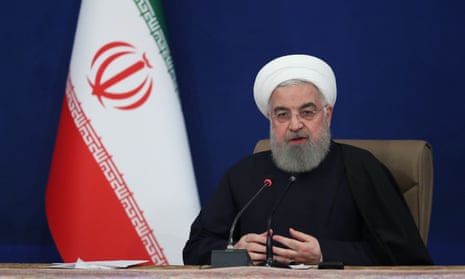EU foreign ministers have agreed not to set fresh preconditions on a revival of the Iran nuclear deal, believing Tehran and Washington should be able to come back into full compliance with the agreement without at this stage needing to accept to extend or strengthen it.
The step removes one of the potential roadblocks to Iran coming back into compliance with the existing deal, so long as the US lifts its sanctions and complies with UN resolutions.
The UK is understood to believe the issue of extending the deal need not be raised until “significant progress” has been made on the US and Iran coming back into compliance.
The opposition to setting fresh preconditions came as foreign ministers that are signatories to the deal – France, Germany, the UK, Iran, China and Russia – convened for the first time in a year and welcomed a possible US return to the deal it unilaterally left in 2018.
The German foreign minister, Heiko Maas, urged Iran not to squander the window of opportunity represented by the incoming Biden administration.
“Now we have to look forward and the next weeks and months will decide whether the deal can be saved,” he told reporters in Berlin. “But it is about much more than that. Behind this is the question of whether a long-term solution to the decades-long dispute about Iran’s nuclear programme can be found through negotiation.”
The UK foreign secretary, Dominic Raab, said it was important Iran did not go ahead with further dilution of its commitments to the deal.
But in what may prove the most significant development, it is understood that the three European powers are content for any discussions on extending and strengthening the deal to wait.
The absence of any European requirement for Iran to agree to the principle of a new deal at this stage may make it easier for the nuclear deal to be revived relatively quickly.
Iran’s leaders have said it will reverse the steps it has taken away from the deal within hours of the US lifting crippling economic sanctions.
One senior EU diplomat said: “Everyone around the table agreed on the need to preserve the deal and to convince the US that it is much better to go back to the deal the way it is and without preconditions and without saying yes we want to add something more. If we want Iran to go back to full compliance then we have to bring the economic rewards that we promised. Today the trade between the European states and Iran is lower than it was before the deal.”
Some observers argue the US and Iran need to move relatively speedily to restore the deal to prevent the Iranian presidential election in June turning into a runaway victory for hardliners opposed to engagement with the west.
A power struggle is under way between conservatives in the parliament, and the Iranian president, Hassan Rouhani, on how to approach negotiations with the US.
The Iranian parliament passed a resolution a fortnight ago demanding that if US sanctions were not lifted by 3 February, Iran should suspend the voluntary implementation of the additional protocol, a move that could lead to Iran’s expulsion from the JCPoA and lead to the end of all its cooperation with UN weapons inspectors at its nuclear sites.
The head of Iran’s Atomic Energy Authority, Ali Akbar Salehi, criticised the parliament for passing the resolution. saying no preconditions should be set for the US return to the deal.
There are strong voices in the US arguing that the Biden administration should not lift sanctions until new sunset clauses, or deadlines, have been renegotiated, Iran’s ballistic missile programme has been addressed and commitments are given by Iran to end its destabilising regional behaviour.
Iran has repeatedly said it is not willing to discuss these wider issues in the context of the nuclear deal, but is willing to talk to its regional neighbours such as Saudi Arabia and the United Arab Emirates.
Iran has continued to allow UN nuclear watchdog inspections but has breached the limits set in the deal on uranium enrichment, leaving the deal on life support.
